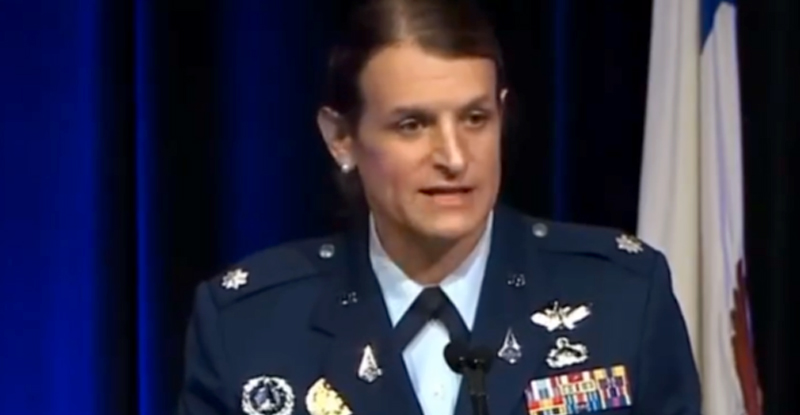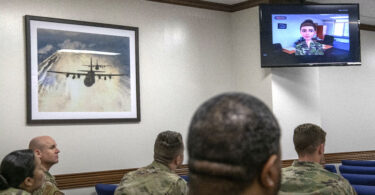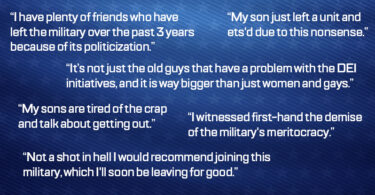Yet those who left because of the vax or harmed by DEI got nothing. (Request for Help form) This small percentage of people and their woke lifestyle pushed on everyone else which wrecked recruiting, retention and morale for the past four years now walk away with a tidy sum of money.
“The senior defense official said troops who separate voluntarily will receive double the payment compared to those who separate involuntarily. For example, an E-5 with 10 years of service would receive about $101,000 for a voluntary separation compared to $51,000 in involuntary separation pay; an O-3 with seven years would receive about $125,000 in voluntary separation pay, but only about $62,000 if separated involuntarily. “
Transgender Troops Face Tough Decision As Deadline to Self-ID Looms
By David Roza | Air & Space Forces Magazine
Active-duty transgender troops have until June 6 to identify themselves and begin the voluntary separation process or wait and risk involuntary separation later—even as questions linger over how that decision might affect their security clearances for future employment.
The Pentagon announced the June 6 deadline on May 15. National Guard and Reserve members have until July 7. A senior defense official said at the time that the military departments must begin the separation process within 30 days after members identify themselves as transgender.
It is unclear how many people may be affected by the order. In February, a senior defense official said there were 4,240 members serving who had been diagnosed with gender dysphoria, and about 1,000 members had received gender-transition surgery since 2014. But how many of those are still serving is not known. Not all transgender troops are diagnosed with gender dysphoria, and only some who are choose to undergo surgery.
“I think everyone is trying to make the decision that they think is best for them and their situation, and they’re doing so in an extreme absence of information,” said Col. Bree Fram, a transgender Guardian who noted she was sharing her personal views and not speaking on behalf of the Space Force or the government.
STARRS NOTE: How about best for the service or country? Being aware of the highly negative effect they had on their fellow servicemembers, thus weakening the military? 2,250+ comments showing CRT/DEI agenda hurts recruitment, retention and moral
Those who voluntarily self-identify are promised “a very significant voluntary separation pay, a covered permanent change of station move to their home of record” and an honorable discharge if there is no misconduct prompting the separation, the defense official said. Other resources, including financial counseling, temporary healthcare coverage, employment assistance, and the Transition Assistance Program, will remain available.
But the process of ousting transgender troops may make it more difficult to land a job once out of uniform. The Pentagon will yank their access to SkillBridge, a program that funds internships, apprenticeships, and training in civilian organizations for Active troops for up to 180 days of service. When asked why, a separate defense official cited a May 15 memo, which specifically excluded SkillBridge because it “is a discretionary program,” meaning it is not required by law.
The senior defense official said troops who separate voluntarily will receive double the payment compared to those who separate involuntarily. For example, an E-5 with 10 years of service would receive about $101,000 for a voluntary separation compared to $51,000 in involuntary separation pay; an O-3 with seven years would receive about $125,000 in voluntary separation pay, but only about $62,000 if separated involuntarily.
The memo states that the military branches will check that troops who ask to leave under the policy have a current diagnosis of gender dysphoria or a history of that diagnosis, or exhibit symptoms consistent with gender dysphoria.
For members who do not self-identify, however, the memo states that “the primary method of identifying … [affected service members] who are no longer eligible for military service will be through compliance with the Individual Medical Readiness (IMR) program.”
The assessment of medical readiness will be conducted through the DoD Periodic Health Assessment, which will include questions about whether service members have a current diagnosis of gender dysphoria or a history of that diagnosis, or exhibit symptoms consistent with gender dysphoria.
Gender dysphoria refers to the sometimes severe stress or anxiety people can feel if their gender identity does not match their sex at birth. It can be treated through behavioral changes, such as dress and mannerisms, or through medical interventions, such as hormone replacement therapy or gender-transition surgery.
Defense Secretary Pete Hegseth contends that a history of gender dysphoria or transition treatment is incompatible with military service.
Transgender troops have served openly since 2016. President Donald Trump moved to bar transgender troops during the Republican’s first term, though troops serving at the time were grandfathered in. President Joe Biden, a Democrat, lifted the ban on transgender recruits entering service when he took office in 2021.
Active-duty troops may apply for a waiver by June 6; Reservists and Guardsmen have until July 7. A person diagnosed with gender dysphoria who managed to serve without clinically significant distress and without attempting to transition could theoretically receive a waiver, but anyone who has attempted to transition is ineligible.
The Air Force implementation plan includes one major difference from the DOD memo: It allows volunteers with 15 to 18 years of service to apply to retire early under the temporary early retirement authority. The Defense Department policy had limited that option to troops with more than 18 but less than 20 years of service to apply for TERA.
Questions Remain
Though the memos give transgender troops a deadline to self-identify, the services have not released in-depth policies on what the process looks like for involuntary separations.
“There is still the unknown of ‘what does it mean to be involuntarily separated?’” Fram said.
The Defense Department said in February that “all service members affected by the policy will be separated with an honorable characterization of service, except where their record otherwise warrants a lower characterization.”
But troops who are involuntarily separated may not receive “certain benefits” available to those who separate voluntarily, the senior defense official said in May. They also may have to pay back bonus or incentive payments for which the required obligation has not been met.
Another complicating factor is the three-letter code listed on troops’ DD-214 discharge papers that signifies the reason for discharge.
Pentagon guidance said the code for enlisted troops separated under the policy will be “JFF,” meaning the discharge was directed by the defense secretary’s authority. But officers “will be processed for separation on the basis that their continued service is not clearly consistent with the interests of national security using the JDK separation program designator code,” the guidance said.
A JDK code would indicate the service member could not be trusted with national security matters, which presumably would make it difficult to retain or obtain a security clearance, said retired Air Force Col. Joshua Kastenberg, a former Air Force judge now teaching law at the University of New Mexico.
“If someone wants to go into classified work, it’s huge,” he said. “Keep in mind that people who leave the military honorably, some of them want to find jobs with contractors that require a clearance because they pay well and it gives them an opportunity to serve national defense without having to put on a uniform. That door may be shut to them as a result of this.”
Asked about the JDK code, a Defense Department official said “the separation code alone does not infer a revocation of a security clearance.” The official could not answer in time whether the JDK code would apply to all officers who are separated under the policy, or just those separated involuntarily.
Transgender troops must now comply with the dress, grooming, and fitness standards of their birth sex, which might not be possible for some service members at this point in their transition. Especially in question is the status of those transgender members whose gender data was changed in military personnel systems. Fram said she has heard anecdotally that some transgender members have been placed on administrative leave since they would not be able to adhere to the standards of their birth sex.
The unknowns mean some transgender service members are taking the voluntary separation option “as the best of bad choices,” Fram said. “But to be clear, it is not voluntary. These people would be continuing to serve if the circumstances were different. They are avoiding the threat of further unknown consequences.”
Two lawsuits challenging the policy change are still being litigated, but the Supreme Court last month overturned an injunction that would have kept transgender troops in uniform until the cases were settled. That process could take years, and Kastenberg doubts it will end favorably for plaintiffs, since there is no statute barring the military from discriminating based on gender identity.
The Pentagon memo directs commanders aware of troops with a diagnosis, a history of, or symptoms consistent with gender dysphoria to refer them to the medical review process. Fram worried that policy could be used against troops “just outside what people expect, particularly in women who may be more masculine than what others expect,” and Kastenberg shared her concern.
When asked if there would be safeguards to prevent misuse of the policy, the senior defense official told reporters in May that the military “has long granted broad discretion and authority to commanders . . . and so, this policy, like many others, will rely on their qualifications, discernment and judgment in how to interpret and apply the guidance.”

Me, me, me, me, me, me, meeeee. “What works for me?”
From the Space Force Colonel who seemed to work on nothing for the past four years except being a transgender activist pushing this agenda on the military that negatively impacted recruitment, retention and morale, not to mention readiness when a person going through transition couldn’t be deployed.
Military colonel reacts to SCOTUS allowing transgender military ban
By Alejandra Marquez Janse | NPR
A ruling from the Supreme Court last week allowed the Trump administration to enforce its ban on transgender military service members, while legal challenges to the policy move forward.
The U.S. military is currently offering voluntary separation to trans troops — after which it will initiate an involuntary separation process.
Col. Bree Fram, an openly transgender member of the U.S. Space Force, is also one of the highest-ranking transgender service members in the armed forces.
All Things Considered host Ailsa Chang spoke with Fram about how this moment affects her life and job.
Fram told NPR she was speaking in a personal capacity and her views “are not necessarily reflective of the Department of Defense.”
This interview has been lightly edited for length and clarity.
Interview highlights
Ailsa Chang: So you have had about a week, Col. Fram, to process this Supreme Court ruling. What has been going through your mind?
Bree Fram: Well, I was devastated and heartbroken by the decision because it doesn’t take into account the real harm that is occurring right now, not just to individual transgender service members, but also to this nation and to our national defense now and far into the future. Because lives are being upended and even if the court cases continue to play out, we are going to lose thousands of highly trained, highly capable skilled individuals that are serving their nation and doing everything that is being asked of them right now here at home and deployed all around the world.
Chang: What about you, Col. Fram? The Trump administration has given active duty trans service members until early next month, right, to leave voluntarily? Have you reached a personal decision about what you will do? What can you tell us?
Fram: One thing I want to make clear is this is not a choice. No one is going to voluntarily choose to leave. We have been told that we are not wanted. And if this policy was not here, no one would be saying, “I’m out.” But right now, we’re in the space where people have to make the best decision for them and for their families. And that includes me.
How do I engage with this? Because I don’t want to take the uniform off. When I was promoted to colonel several years ago, I felt like it was closer to the beginning than the end, because there were so many amazing adventures ahead and quite an opportunity to train and develop the next generation.
So, I and thousands of others have to look at this and say, “What works for me?”
Because if we don’t take what is being offered in front of us right now, what are the additional adverse consequences that may come with the involuntary phase?
Chang: So, to repeat some of your words, how will you stay engaged if you do indeed have to take the uniform off?
Fram: Ailsa, that’s the million dollar question. What I know is that I’ve got 22-plus years of service to this nation behind me and if I have to take the uniform off, I don’t expect that service to end. I swore an oath to support and defend the Constitution and we do not swear oaths just to live up to them when it’s easy. I absolutely expect later on to continue to live up to that oath and fight for what I believe is right in this nation and make that better tomorrow that we all believe in as Americans.
Chang: Well, while the Supreme Court ruling allows this ban on transgender troops to be enforced, legal challenges are proceeding in lower court. How hopeful are you that those courts, maybe even the Supreme Court, eventually will rule in favor of trans service members?
Fram: Well, I’m hopeful for several reasons. One, in the rulings we have already seen from the district courts that really pointed to our example of service as Exhibit A for why the government’s arguments basically don’t have a leg to stand on. And the experiences of not only the plaintiffs in the cases, but the thousands of service members that are meeting or exceeding standards.
Chang: The military’s policy on trans service members has changed quite often, right, from President Obama to the first Trump term to Biden, now to the second Trump term. Does being in flux just feel kind of familiar to you or does this moment feel somewhat different?
Fram: This has been an absolute roller-coaster and the emotional toll has been intense. But through it all, we have absolutely accomplished the mission. And that’s what makes me so proud of transgender service members.
Highest ranking trans member of US Space Force says ‘inclusion is a national security imperative’
Naval War College Hosts Trans-Identifying Colonel To Discuss LGBT ‘Experiences’
Air Force Academy Highlights Transgender Officer At Leadership Summit
Members of Congress Press Air Force Academy on Trans Colonel’s Partisan Speech at Recent Conference
Image below personifies the woke nightmare of the Biden administration years: 4 “women” at a DOD event, only the two on the right are actually men. The woman on the far-left (pun intended) was the woke Deputy Secretary of Defense. The woman in pink was the #2 in the Air Force–Under Secretary of the Air Force, a lesbian who actively discriminated against Christian servicemembers.








Leave a Comment